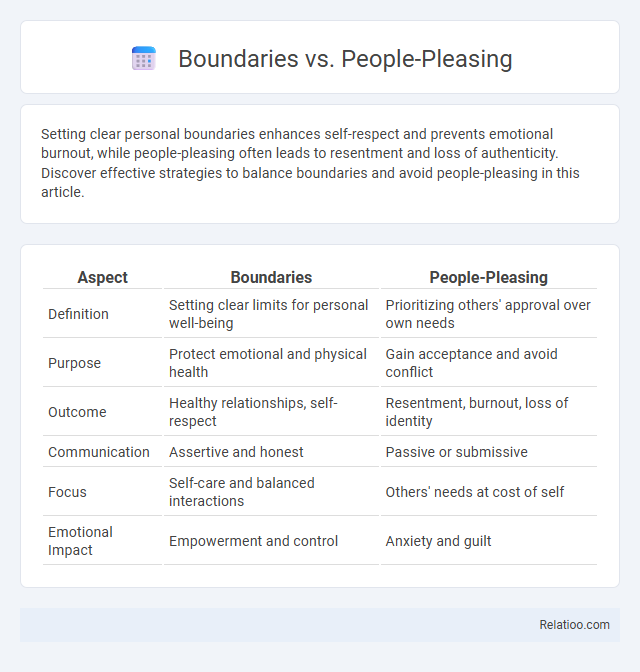Setting clear personal boundaries enhances self-respect and prevents emotional burnout, while people-pleasing often leads to resentment and loss of authenticity. Discover effective strategies to balance boundaries and avoid people-pleasing in this article.
Table of Comparison
| Aspect | Boundaries | People-Pleasing |
|---|---|---|
| Definition | Setting clear limits for personal well-being | Prioritizing others' approval over own needs |
| Purpose | Protect emotional and physical health | Gain acceptance and avoid conflict |
| Outcome | Healthy relationships, self-respect | Resentment, burnout, loss of identity |
| Communication | Assertive and honest | Passive or submissive |
| Focus | Self-care and balanced interactions | Others' needs at cost of self |
| Emotional Impact | Empowerment and control | Anxiety and guilt |
Understanding Boundaries and People-Pleasing
Understanding boundaries involves recognizing and asserting your personal limits to protect your well-being and maintain healthy relationships. People-pleasing often stems from a desire to avoid conflict or gain approval, leading to compromised boundaries and increased stress. Your awareness of these dynamics empowers you to set clear, respectful limits without feeling guilty.
Key Differences Between Boundaries and People-Pleasing
Setting boundaries involves clearly communicating your needs and limits to protect your well-being, while people-pleasing often means sacrificing your own desires to gain approval from others. Boundaries prioritize your mental and emotional health by saying "no" when necessary, whereas people-pleasing leads to guilt and resentment as you overextend yourself. Your ability to distinguish between these ensures healthier relationships and reduces unnecessary guilt associated with trying to please everyone.
The Psychology Behind People-Pleasing
People-pleasing often stems from deep-seated psychological needs for acceptance and fear of rejection, leading individuals to compromise their boundaries. This behavior is linked to low self-esteem and anxiety, where maintaining others' approval becomes a coping mechanism to mitigate feelings of guilt. Understanding the interplay between boundaries and guilt is crucial for breaking the cycle of people-pleasing and fostering healthier self-respect and emotional resilience.
Why Setting Boundaries Matters
Setting boundaries is essential for preserving your mental health and fostering respectful relationships by clearly defining what behaviors you will accept. People-pleasing often erodes these boundaries, leading to feelings of overwhelm and resentment, while guilt can sabotage your ability to assert your needs effectively. Recognizing the importance of boundaries empowers you to maintain balance and protect your emotional well-being.
Signs You May Be a People-Pleaser
You may be a people-pleaser if you constantly say yes to requests even when overwhelmed, struggle to set boundaries, and fear disappointing others at the expense of your own needs. Signs include feeling guilty after asserting yourself, prioritizing others' happiness over your own, and avoiding conflict to maintain approval. Recognizing these behaviors is crucial for developing healthy boundaries and reducing unnecessary guilt.
Common Myths About Setting Boundaries
Common myths about setting boundaries include the belief that it is selfish, causes conflict, or means you are rejecting people, which can discourage you from asserting your needs. Setting boundaries is essential for maintaining healthy relationships and personal well-being by clearly communicating your limits without guilt. Understanding that boundaries protect your energy rather than alienate others helps you overcome people-pleasing tendencies and reduces unnecessary guilt.
The Emotional Impact of Poor Boundaries
Poor boundaries often lead to emotional exhaustion, anxiety, and diminished self-worth as you prioritize others' needs over your own. People-pleasing behavior reinforces this cycle, causing chronic guilt and internal conflict when your desires remain unresolved. Establishing clear boundaries protects your mental health, fostering emotional resilience and authentic relationships.
How Healthy Boundaries Promote Self-Respect
Healthy boundaries establish clear limits that protect personal values and emotional well-being, preventing the tendency to engage in people-pleasing behaviors driven by guilt or fear of rejection. By asserting boundaries, individuals reinforce self-respect and communicate their needs clearly, fostering authentic relationships based on mutual respect rather than obligation. This practice reduces feelings of guilt associated with disappointing others and empowers individuals to prioritize their own mental and emotional health.
Practical Strategies for Setting Boundaries
Establishing clear boundaries involves recognizing your limits and communicating them firmly to prevent people-pleasing behaviors that often lead to unnecessary guilt. Use assertive communication techniques such as "I" statements to express your needs without apologizing or over-explaining, which reinforces your sense of self-respect and control. Prioritizing Your mental health requires consistent practice of saying no and setting realistic expectations to reduce feelings of guilt associated with disappointing others.
Overcoming Guilt When Prioritizing Your Needs
Establishing clear boundaries is essential for maintaining emotional health and preventing people-pleasing habits rooted in guilt. When you prioritize your needs, overcoming guilt involves recognizing that self-care is not selfish but necessary for balanced relationships. Reframing your mindset to view boundaries as acts of respect for yourself and others fosters empowerment and reduces feelings of undeserved guilt.

Infographic: Boundaries vs People-Pleasing
 relatioo.com
relatioo.com